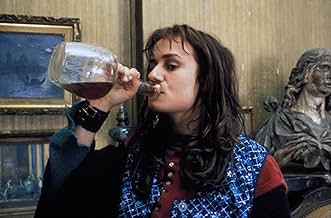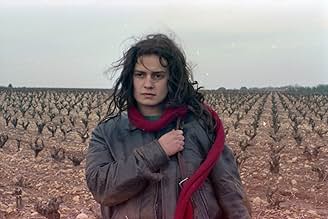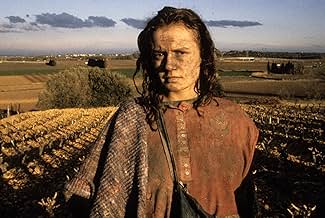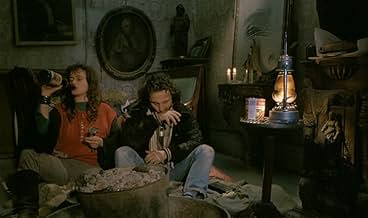A young woman's body is found frozen in a ditch. Through flashbacks and interviews, we see the events that led to her inevitable death.A young woman's body is found frozen in a ditch. Through flashbacks and interviews, we see the events that led to her inevitable death.A young woman's body is found frozen in a ditch. Through flashbacks and interviews, we see the events that led to her inevitable death.
- Awards
- 8 wins & 5 nominations total
- Director
- Writer
- All cast & crew
- Production, box office & more at IMDbPro
Featured reviews
With an antagonizing protagonist who is as doomed as the plane trees in the film...this film could be seen as strictly nihilistic. I recently watched "SherryBaby" and strongly preferred this film which I watched a week prior, and yet I still find myself pondering Sandrine Bonnaire's portrayal of a woman who is stranded.
Indeed "No one makes it alone" could better be the tag line here, and Bonnaire's Mona goes on an odyssey that is nothing short of harrowing. Also trading heroin chic for (self-imposed?) homeless bleak pushed us into less charted filmic waters. Choosing an unknown for the title role was also a good call I suspect. The film is now older than it's lead actress was at the time.
So much of the film talks about how Mona stinks, perhaps smell-a-vision would have helped ;> Honestly her face is still too attractive, although wide and maybe manly in a way, that for me the sense of her scent didn't wash. That being said, her disaffection was on display so well, that you could see her as having a dirty soul. At nearly every chance of being likable she veers to the other direction, the one notable exception for me being her interaction with the "platonologne" (is that like octogenarian, don't know the French...the characters all had interesting descriptions in the credits)..
Additionally, from the English subtitles and snatches of French, I sense the dialog (should I say dialogue) in this was quite cutting and clever in parts.
While Mona lives without roof or law, while she may move without purpose or direction, she is more than a human tumbleweed. She does not live without leaving a trace...but the filmmaker keeps us intentionally distant from her, we are never allowed inside her mental tent. Thus our composite sketch of her is as complex and contradictory as the people she encounters. Not only does Mona live without control over her life, her death as well eludes her.
Viewers may find it less easy to escape.
Thurston Hunger 7/10
Indeed "No one makes it alone" could better be the tag line here, and Bonnaire's Mona goes on an odyssey that is nothing short of harrowing. Also trading heroin chic for (self-imposed?) homeless bleak pushed us into less charted filmic waters. Choosing an unknown for the title role was also a good call I suspect. The film is now older than it's lead actress was at the time.
So much of the film talks about how Mona stinks, perhaps smell-a-vision would have helped ;> Honestly her face is still too attractive, although wide and maybe manly in a way, that for me the sense of her scent didn't wash. That being said, her disaffection was on display so well, that you could see her as having a dirty soul. At nearly every chance of being likable she veers to the other direction, the one notable exception for me being her interaction with the "platonologne" (is that like octogenarian, don't know the French...the characters all had interesting descriptions in the credits)..
Additionally, from the English subtitles and snatches of French, I sense the dialog (should I say dialogue) in this was quite cutting and clever in parts.
While Mona lives without roof or law, while she may move without purpose or direction, she is more than a human tumbleweed. She does not live without leaving a trace...but the filmmaker keeps us intentionally distant from her, we are never allowed inside her mental tent. Thus our composite sketch of her is as complex and contradictory as the people she encounters. Not only does Mona live without control over her life, her death as well eludes her.
Viewers may find it less easy to escape.
Thurston Hunger 7/10
What I admired the most about "Vagabond" is the objective, evenhanded approach of the director towards her "heroine". She neither praises nor condemns her chosen "lifestyle", she simply observes it - and she observes it so well that this feels like the work of someone who's had first-hand experiences with similar people and surroundings. To be perfectly honest, the film doesn't have much psychological (or sociological) depth, and it can get boring at times while you're watching it, but right after it's over, you know that you've seen a good movie. (***)
sans toit ni loi ( without a roof nor rule) by Agnes Varda
Visual poetry in films is rarely sublime.Mostly its an interpretation that is fed to us either by the director of the film or some high-faultin critic who manages to see color in sepiated walls.The rare film that manages to transcend leaves you speechless with nothing to say as words fail to capture the essence , beauty and enigma of that film. All you can say is today I was blessed. Like a born again christian or a corpulent evangelist you wish to celebrate your new found faith with words , gestures , anything that says to the director of the film, you gave me a day of absolute completeness today and a film that will forever stay with me like unrequited love. That transcendental, evocative , sensitive , visually dazzling , transcendence is sans toit ni loi by agnes Varda. The film as has been pointed out is the cinematic equivalent of ulysses . Like James Joyce , varda lets rip a stream of consciousness that is disturbing , sincere and beautifully sublime.The protoganist is a young female drifter, a vagabond who is eternally free. She requires human contact only to fulfill her basic needs and her solitude is complete and absolute , accentuated by her complete disdain for authority or advise.The people she meets are all left with indelible memories of her.Those that pity her are later assailed by thier own infirmities. She refuses to blend or compromise and as one character says is perpetually withering.She dies alone and uncared for and she leaves absolutely no conventional emotional baggage behind.This isnt about a hippie , or a bum , or a dope addict or just a mentally unsound person. Its about a compassionate person who choses to abnegate all her social bonds and moral barriers and lives for nothing more than basic survival. She is the eternal soul that is freedom. Pure , absolute and totally decadent freedom.
Visual poetry in films is rarely sublime.Mostly its an interpretation that is fed to us either by the director of the film or some high-faultin critic who manages to see color in sepiated walls.The rare film that manages to transcend leaves you speechless with nothing to say as words fail to capture the essence , beauty and enigma of that film. All you can say is today I was blessed. Like a born again christian or a corpulent evangelist you wish to celebrate your new found faith with words , gestures , anything that says to the director of the film, you gave me a day of absolute completeness today and a film that will forever stay with me like unrequited love. That transcendental, evocative , sensitive , visually dazzling , transcendence is sans toit ni loi by agnes Varda. The film as has been pointed out is the cinematic equivalent of ulysses . Like James Joyce , varda lets rip a stream of consciousness that is disturbing , sincere and beautifully sublime.The protoganist is a young female drifter, a vagabond who is eternally free. She requires human contact only to fulfill her basic needs and her solitude is complete and absolute , accentuated by her complete disdain for authority or advise.The people she meets are all left with indelible memories of her.Those that pity her are later assailed by thier own infirmities. She refuses to blend or compromise and as one character says is perpetually withering.She dies alone and uncared for and she leaves absolutely no conventional emotional baggage behind.This isnt about a hippie , or a bum , or a dope addict or just a mentally unsound person. Its about a compassionate person who choses to abnegate all her social bonds and moral barriers and lives for nothing more than basic survival. She is the eternal soul that is freedom. Pure , absolute and totally decadent freedom.
Agnès Varda is commonly associated with the Nouvelle Vague and more than François Truffaut, Jean-Luc "God Ard" or Eric Rohmer, she delivered some of the jewels of this French trend with "Cléo De 5 à 7" (1961). It doesn't mean that everything she made turned into gold. One can skip "les Créatures" (1966) without remorse. Twenty years later, she issued her strongest work since "Cléo De 5 à 7" which justifiably dominated from an artistic perspective French cinematographic production: "Sans Toi Ni Loi" that caused a stir.
It works as an alternation of flashes-back and interviews with people about their recollections involving a female rambler named Mona. We won't know much about herself. After she passed her high school diploma, she started to work for different bosses as a secretary but grew tired of his job. So, she packed in to leave for adventure through odd jobs. However, Varda's heroine keeps all her mystery and ambiguity. Are we really sure about what she says? Doesn't she lie? The female filmmaker doesn't comfort the audience because as the elements of the puzzle are pieced together, she throws the people who met Mona out in the same basket, either it is this university professor, this Maroccan guest worker or this former philosophy student who believed in the events of May 1968 in France: they are all responsible for Mona's death because of their egoism, their lack of communication with her. Varda delivers a similar message to her 1961 film: loneliness is a burden and it's better to open oneself to others to make things improve.
"Sans Toi Ni Loi" has the form of a documentary with a gritty tonality in which the female filmmaker keeps a certain distance with her heroine and everything she goes through. Thanks to this, tawdry or violent sequences take another dimension like the moment when the garage owner leaves Mona's tent pulling up his trousers or the man who rapes her in the woods. We won't see the horrid act.
Varda hired non-professional actors and that's why her film has a larger than life feel. An impression accentuated by Sandrine Bonnaire's sensational performance. She "lives" more than she acts her role. The role of this rambler fits her like a glove.
This is one that can stand multiple viewings.
It works as an alternation of flashes-back and interviews with people about their recollections involving a female rambler named Mona. We won't know much about herself. After she passed her high school diploma, she started to work for different bosses as a secretary but grew tired of his job. So, she packed in to leave for adventure through odd jobs. However, Varda's heroine keeps all her mystery and ambiguity. Are we really sure about what she says? Doesn't she lie? The female filmmaker doesn't comfort the audience because as the elements of the puzzle are pieced together, she throws the people who met Mona out in the same basket, either it is this university professor, this Maroccan guest worker or this former philosophy student who believed in the events of May 1968 in France: they are all responsible for Mona's death because of their egoism, their lack of communication with her. Varda delivers a similar message to her 1961 film: loneliness is a burden and it's better to open oneself to others to make things improve.
"Sans Toi Ni Loi" has the form of a documentary with a gritty tonality in which the female filmmaker keeps a certain distance with her heroine and everything she goes through. Thanks to this, tawdry or violent sequences take another dimension like the moment when the garage owner leaves Mona's tent pulling up his trousers or the man who rapes her in the woods. We won't see the horrid act.
Varda hired non-professional actors and that's why her film has a larger than life feel. An impression accentuated by Sandrine Bonnaire's sensational performance. She "lives" more than she acts her role. The role of this rambler fits her like a glove.
This is one that can stand multiple viewings.
10hernanjp
A Rave! Beautifully photographed by Patrick Blossier, every shot, every frame is a delightfully balanced composition of light, color, and framing.
What's more amazing still is how Varda can make such a depressing story so mesmerizing. It is a touching, enchanting story of a lost girl slowly sinking deeper and deeper into society's refuse pile. And even though from the first reel we know her fate, we have to see how it unfolds. I don't remember the last time I saw such a beautiful film. One for the film schools. A masterpiece of French neo-realism.
What's more amazing still is how Varda can make such a depressing story so mesmerizing. It is a touching, enchanting story of a lost girl slowly sinking deeper and deeper into society's refuse pile. And even though from the first reel we know her fate, we have to see how it unfolds. I don't remember the last time I saw such a beautiful film. One for the film schools. A masterpiece of French neo-realism.
Did you know
- TriviaThe episodes in which the main character is involved are each marked off by a tracking shot, 13 of them.
- GoofsIn the opening segment, Mona (Sandrine Bonnaire) is lying in a ditch in the vineyard. The character Mona is supposed to be dead, but if you look at the actress's neck you can clearly see a neck artery visibly pulsing.
- Quotes
les Bergers: She blew in like the wind. No plans, no goals... No wishes, no wants... We suggested things to her. She didn't want to do a thing. Wandering? That's withering. By proving she's useless, she helps a system she rejects. It's not wandering, it's withering.
- ConnectionsFeatured in Siskel & Ebert: The Best Films of 1986 (1987)
- SoundtracksVariations sur la Vita
Composed and directed by Joanna Bruzdowicz
- How long is Vagabond?Powered by Alexa
Details
- Release date
- Countries of origin
- Official site
- Languages
- Also known as
- Without Roof or Law
- Filming locations
- Nîmes, Gard, France(train station)
- Production companies
- See more company credits at IMDbPro
Contribute to this page
Suggest an edit or add missing content

![Watch Bande-annonce [OV]](https://m.media-amazon.com/images/M/MV5BYWE4N2ViZjQtYzgyNy00MDIxLTk0ZWUtNjE5MmJlMWU3OTQ0XkEyXkFqcGdeQXRyYW5zY29kZS13b3JrZmxvdw@@._V1_QL75_UX500_CR0)























